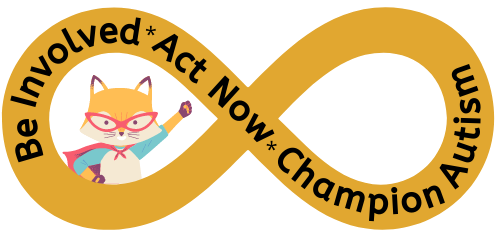Signs of Autism Spectrum Disorder | San Diego, CA
We’ve put together a great resource for parents who would like to understand the autism spectrum disorder and recognize the signs of autism in toddlers and children. Our San Diego-based organization, Be Involved. Act Now. Champion Autism., is knowledgeable about autism symptoms in toddlers, degrees of severity and every stage of their development from there. These descriptions are a guide to many of the behaviors observed in toddlers, children and young adults with autism spectrum disorder. It is important to remember that everyone is different and very few children or adults will exhibit all of these characteristics at the same time. The three lists show a typical progression of autism symptoms in childhood and into adulthood.
Autism Symptoms in Toddlers
There could be various signs of autism in toddlers when they’re affected by this disorder. Some of these traits may include a resistance to solid foods, unusual responses to people and lack of eye contact. A combination of these characteristics is a stronger indication of autism than one isolated sign. The following are autism symptoms in toddlers, between the ages of 12 to 36 months:
- Socially: Often there is no desire to be cuddled and strongly prefer familiar people. Toddlers may treat people as objects rather than a source of comfort and avoid social situations, preferring to be alone. They also prefer routines and are very resistant to change and new environments. You may notice limited development of play activities as well, particularly imaginative play.
- Speech: At this stage, there is usually an absence of speech. Or, there are unusual speech patterns such as repeating words and phrases. This is known as echolalia.
- Behavior: Constant crying or unusual absence of crying and repetitive movements, such as hand flapping, prolonged rocking or spinning of objects. Another sign is obsessive interest in certain toys or objects while ignoring other things. They may have sleeping problems, difficulty with toilet training and become extremely distressed by certain noises or busy public places such as shopping centers.
Autism Symptoms in Children
The more distressing signs of autism in children usually decrease as they get a little older. As they acclimate to their environment, there can be a period of relative calm and adjustment. Although, the resistance to the demands of others may still be present. Accompanying this behavioral trait, a child may demonstrate a lack of motivation or desire to please others. In addition to these signs, other autism symptoms in children may include any of the following:
- Socially: There’s an increase in social interaction as they better tolerate playing beside other children and begin to show attachments to certain people. However, the child’s difficulty understanding other people and interpreting what is going on around them leads to significant levels of anxiety. They also have difficulty transferring skills learned in one setting to another setting.
- Speech: Echolalic speech decreases and spontaneous speech emerges. About half of the children who are non-verbal in the preschool years will acquire some speech.
- Behavioral: School behavior problems can occur, often because the child finds it difficult to make social judgements around other children. Ritualistic and compulsive behavior patterns are very common. Hyperactivity and a poor attention span are often observed, usually because the child has trouble understanding instructions from the teacher.
Autism Symptoms in Adulthood
The signs of autism in children can become exaggerated when compared to others in their age group as they go through adolescence and enter adulthood. This includes behavioral outbursts and mood imbalances, however, individuals with autism spectrum disorder all eventually resume a calmer demeanor after this phase is over. Signs of autism in children manifest themselves in particular ways in their teens, such as delayed sexual interest, differences in physical appearance, possibility of seizures and increased anxiety. Young adults who exhibit signs of autism are able to partly overcome their difficulties with specialized and sustained support.
Contact Us for Resources in San Diego
Be Involved. Act Now. Champion Autism. is a nonprofit organization that aims to serve as a resource for families in San Diego, CA, who want their autistic children to have healthy physical and psychological development. Call us at (888) 815-2676 for more information.



